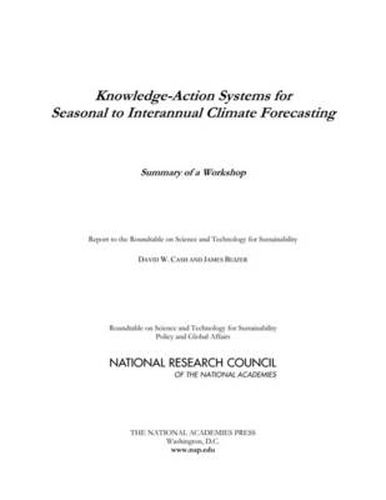Readings Newsletter
Become a Readings Member to make your shopping experience even easier.
Sign in or sign up for free!
You’re not far away from qualifying for FREE standard shipping within Australia
You’ve qualified for FREE standard shipping within Australia
The cart is loading…






The National Academies’ Roundtable on Science and Technology for Sustainability hosted a workshop Knowledge-Action Systems for Seasonal to Interannual Climate Forecasting in 2004 to discover and distill general lessons about the design of effective systems for linking knowledge with action from the last decade’s experience with the production and application of seasonal to interannual climate forecasts. Workshop participants described lessons they had learned based on their experiences developing, applying, and using decision support systems in the United States, Columbia, Brazil, and Australia.Some of the key lessons discussed, as characterized by David Cash and James Buizer, were that effective knowledge-action systems: define and frame the problem to be addressed via collaboration between knowledge users and knowledge producers; tend to be end-to-end systems that link user needs to basic scientific findings and observations; are often anchored in boundary organizations that act as intermediaries between nodes in the system - most notably between scientists and decision makers; feature flexible processes and institutions to be responsive to what is learned; use funding strategies tailored to the dual public/private character of such systems; and require people who can work across disciplines, issue areas, and the knowledge&action interface.
$9.00 standard shipping within Australia
FREE standard shipping within Australia for orders over $100.00
Express & International shipping calculated at checkout
The National Academies’ Roundtable on Science and Technology for Sustainability hosted a workshop Knowledge-Action Systems for Seasonal to Interannual Climate Forecasting in 2004 to discover and distill general lessons about the design of effective systems for linking knowledge with action from the last decade’s experience with the production and application of seasonal to interannual climate forecasts. Workshop participants described lessons they had learned based on their experiences developing, applying, and using decision support systems in the United States, Columbia, Brazil, and Australia.Some of the key lessons discussed, as characterized by David Cash and James Buizer, were that effective knowledge-action systems: define and frame the problem to be addressed via collaboration between knowledge users and knowledge producers; tend to be end-to-end systems that link user needs to basic scientific findings and observations; are often anchored in boundary organizations that act as intermediaries between nodes in the system - most notably between scientists and decision makers; feature flexible processes and institutions to be responsive to what is learned; use funding strategies tailored to the dual public/private character of such systems; and require people who can work across disciplines, issue areas, and the knowledge&action interface.